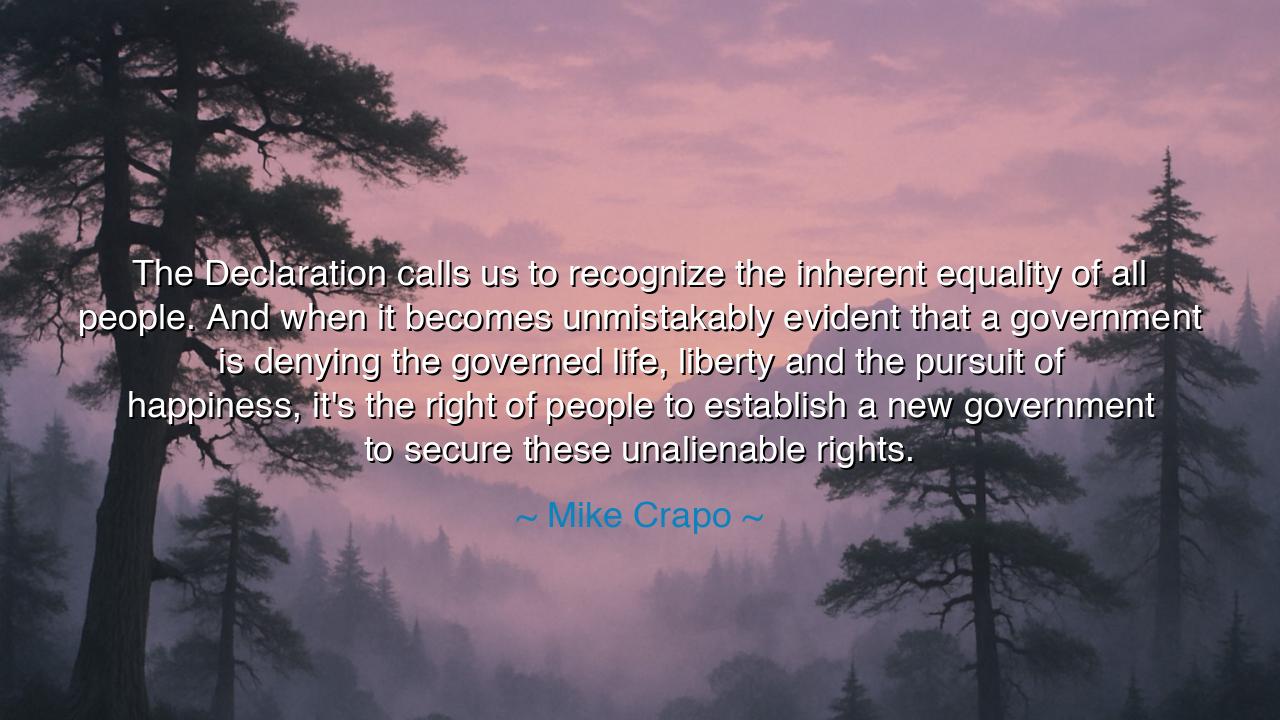
The Declaration calls us to recognize the inherent equality of
The Declaration calls us to recognize the inherent equality of all people. And when it becomes unmistakably evident that a government is denying the governed life, liberty and the pursuit of happiness, it's the right of people to establish a new government to secure these unalienable rights.






In the echoing halls of freedom’s memory, where the words of the Founders still burn like stars in the firmament, the statesman Mike Crapo spoke a truth that binds the past to the present:
"The Declaration calls us to recognize the inherent equality of all people. And when it becomes unmistakably evident that a government is denying the governed life, liberty and the pursuit of happiness, it's the right of people to establish a new government to secure these unalienable rights."
This declaration is no small utterance. It is the living echo of the American Revolution, a reverent bow to the document that gave birth to a nation — the Declaration of Independence. In these words, Crapo summons the spirit of that sacred parchment, which proclaims that human dignity is not a gift bestowed by rulers, but an inheritance born with every soul. His message is not one of rebellion for its own sake, but of reverence for a deeper truth: that governments exist only to serve the governed, and when they forget that sacred trust, the people — by right and by duty — must rise to restore it.
The meaning of his words reaches to the very foundations of moral order. The inherent equality of all people is not a law written by kings, nor a decree shaped by legislatures — it is the law of nature and of nature’s God. From this equality flows the truth that every person possesses certain unalienable rights, among them life, liberty, and the pursuit of happiness. Governments, then, are not the source of these rights, but their guardians. When they fail to protect them — when they twist power into oppression, or authority into tyranny — they break the very covenant upon which their legitimacy stands. In such a moment, the people do not become rebels; they become restorers of justice, returning the world to its rightful balance.
The origin of this philosophy lies in the fires of 1776, when ordinary men declared extraordinary truths. The colonies, weary of the British crown’s arrogance, proclaimed that they were no longer subjects, but free citizens — masters of their own destiny. Their revolution was not born of greed, but of principle. They did not fight for conquest, but for the preservation of rights that had been trampled by indifference and abuse. Their courage lit the flame that would guide generations to come: that liberty, once awakened, cannot be put back to sleep. Crapo’s words are the modern echo of that ancient vow — that whenever power grows deaf to justice, the governed must reclaim their voice.
History itself bears witness to the power of this truth. In the twentieth century, when Dr. Martin Luther King Jr. and countless others marched against segregation and injustice, they did not seek to destroy their nation — they sought to redeem it. They held the Declaration in their hearts and demanded that its promises be honored not in word alone, but in deed. King reminded the world that America had signed “a promissory note” to all its people, and that the time had come for that note to be fulfilled. Their struggle was not rebellion; it was restoration. They did not seek a new government, but a purified one — a nation truer to its founding creed that all are created equal.
But Crapo’s words also speak to a timeless warning: that liberty, once achieved, must be guarded with vigilance. Tyranny does not always arrive in thunder and conquest — sometimes it creeps softly, disguised as comfort, as order, as convenience. Governments begin to control what they once served, to command what they once protected. When that happens, the people must remember that freedom is not preserved by silence, but by courage. The right to establish a new order — whether through reform, protest, or transformation — is not an invitation to chaos, but a reminder that sovereignty belongs forever to the people, not to the rulers.
There is a sacred balance in these words. To recognize equality is to see the divine spark in every human being; to defend liberty is to honor that spark with action. Governments that forget the worth of the individual become machines that consume the soul of their citizens. But people who forget their own responsibility — who surrender vigilance, who trade their freedom for comfort — become complicit in their own chains. Thus, Crapo’s wisdom is not only for leaders, but for all who live under law: freedom endures only when the governed remain awake to its cost.
So let this teaching stand, passed down to the generations like a sacred flame: Government is the servant of liberty, not its master. When it serves justice, support it. When it strays, correct it. And when it betrays the people’s trust entirely, have the courage to rebuild it — not with hatred, but with hope; not with vengeance, but with vision. For the right to reform and renew one’s government is not rebellion against the state — it is allegiance to the truth that life, liberty, and the pursuit of happiness belong to all, forever and without condition.
Thus ends the teaching: guard the rights that make you human, cherish the equality that makes you divine, and never forget that the strength of any government lies not in its power, but in its fidelity to the eternal promise of freedom.






AAdministratorAdministrator
Welcome, honored guests. Please leave a comment, we will respond soon